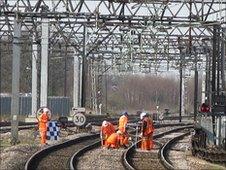Early report into high costs of UK railways
- Published

UK maintenance costs are higher than in parts of Europe, officials say
A review into why railways cost more to run in Britain than elsewhere in Europe is to report back early.
A full report is expected next March but Transport Secretary Philip Hammond has asked for transport expert Sir Roy McNulty's initial findings by autumn.
The transport department says Network Rail's renewal and maintenance spending is up to 50% less efficient than some European rivals'.
Infrastructure firm Network Rail says it has reduced costs by £6bn.
Civil engineering costs in the UK are typically up to double those in Europe, according to a study by the department and the Office of Rail Regulation (ORR).
Train operating costs in Britain are above their level in 1996-97, when privatisation was introduced, and income from users has not kept pace.
Meanwhile, franchise systems in countries such as Germany and Sweden have reportedly led to cost reductions of between 20% and 40%, it found.
Former Transport Secretary Lord Adonis announced the independent review into rail value for money last December. It will report fully in March 2011.
In requesting an interim report this autumn, Mr Hammond said the review would help to create "an efficient and modern railway".
"Passengers and taxpayers will rightly ask why it is that our railways in the UK are so much more expensive than those in the rest of Europe," he said.
"Given the very significant financial constraints that we face, it is essential that we drive out inefficiencies and reduce costs... to protect train services and avoid very high rises in train fares."
Sir Roy said it would not be easy to find solutions to the "significant challenges" Britain's railways faced.
Network Rail is funded largely by the government to maintain track and signalling systems but does not pay dividends.
A spokesman for the firm said it welcomed the review.
"This is a journey on which Network Rail has already made good progress with over £6bn, or 27%, cut from the cost of running the rail network over the past five years and a further 24% targeted by 2014," he added.
- Published3 June 2010